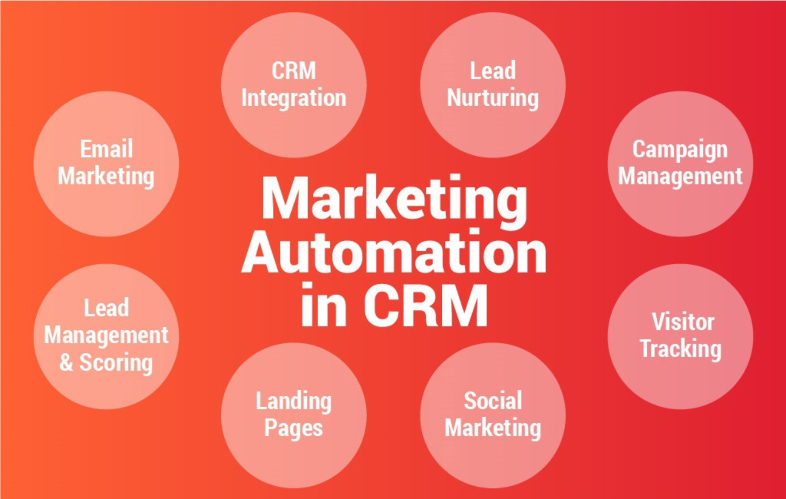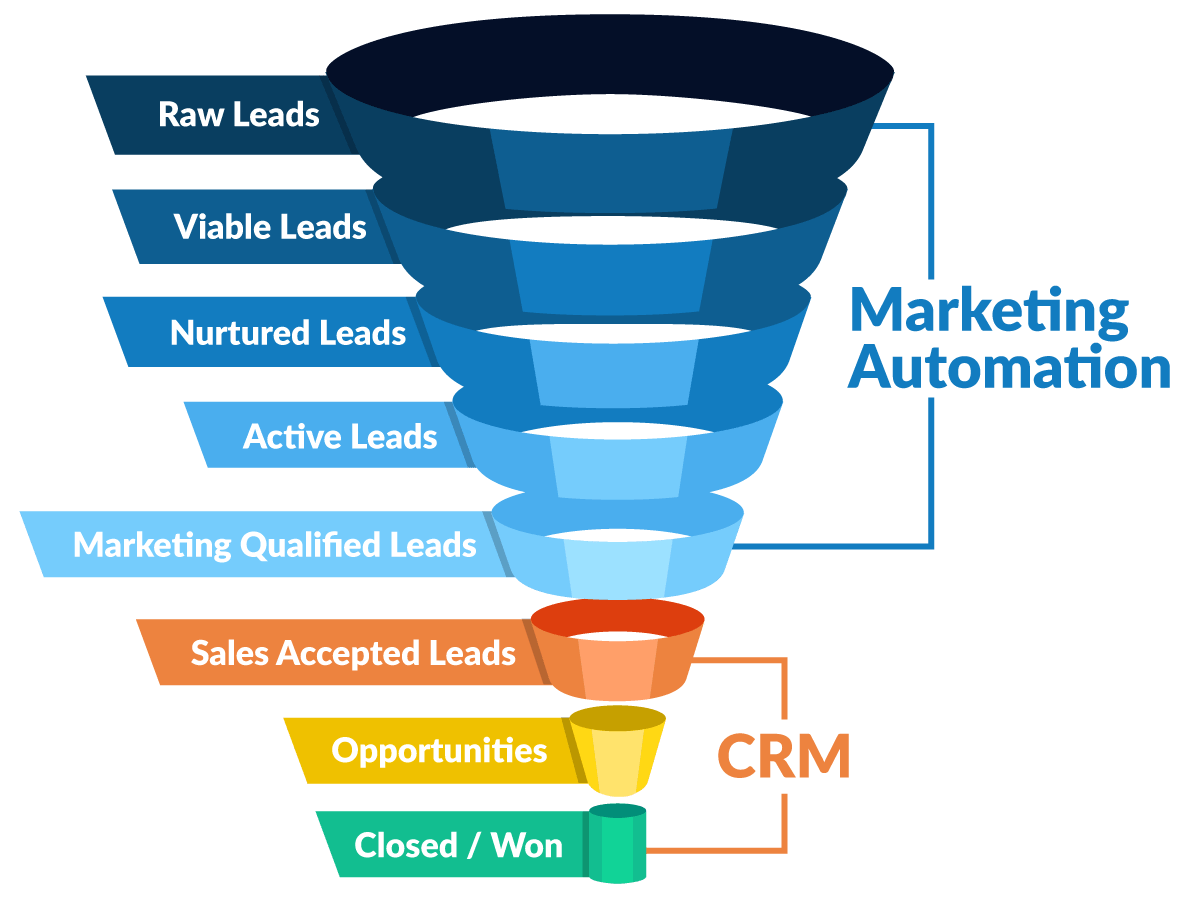Automated marketing CRM (customer relationship management) is revolutionizing the way businesses engage with customers and prospects. By automating repetitive tasks and leveraging data-driven insights, automated marketing CRM empowers businesses to nurture leads, strengthen customer relationships, and drive sales growth.
In this comprehensive guide, we will delve into the key benefits, features, and best practices of automated marketing CRM. We will also explore the challenges and future trends in this rapidly evolving field, providing you with the knowledge and tools you need to optimize your marketing and sales efforts.
Definition and Overview of Automated Marketing CRM
An automated marketing CRM (Customer Relationship Management) is a software platform that streamlines and automates marketing and sales processes, enabling businesses to manage customer interactions and nurture leads more efficiently.
Key features of automated marketing CRMs include:
- Lead capture and management:Capture and track leads from various channels.
- Lead nurturing:Automate personalized email campaigns and nurture leads through targeted content.
- Segmentation and targeting:Segment leads based on demographics, behavior, and preferences for targeted marketing.
- Sales force automation:Automate tasks like lead assignment, opportunity tracking, and forecasting.
- Analytics and reporting:Track key metrics and generate reports to measure campaign performance and optimize strategies.
Examples of businesses that have successfully implemented automated marketing CRMs include:
- Salesforce:A leading provider of cloud-based CRM solutions for businesses of all sizes.
- HubSpot:A popular all-in-one marketing, sales, and CRM platform for small businesses.
- Marketo:A comprehensive marketing automation platform for large enterprises.
Benefits of Automated Marketing CRM
Automated marketing CRM offers a range of benefits that can significantly enhance lead generation, customer relationship management, and sales and marketing alignment.
In terms of lead generation, automated marketing CRM can streamline and automate lead capture processes, enabling businesses to generate more qualified leads with less manual effort. It can also provide insights into lead behavior, helping businesses better understand their target audience and tailor their marketing campaigns accordingly.
Lead Generation
- Streamlined lead capture and qualification
- Automated lead nurturing and follow-up
- Lead scoring and segmentation for targeted marketing
In terms of customer relationship management, automated marketing CRM can help businesses build stronger relationships with their customers by providing a personalized and consistent experience across all channels. It can also help businesses track customer interactions, identify opportunities for upselling and cross-selling, and provide timely and relevant customer support.
Customer Relationship Management
- Personalized customer experiences
- Improved customer communication and engagement
- Increased customer loyalty and retention
Finally, automated marketing CRM can help businesses improve sales and marketing alignment by providing a shared view of the customer journey. This can help sales and marketing teams work together more effectively to identify and target qualified leads, nurture them through the sales funnel, and close more deals.
Sales and Marketing Alignment
- Improved communication and collaboration
- Shared visibility into customer data
- Increased sales productivity and efficiency
Key Features of Automated Marketing CRM
Automated marketing CRM software offers a comprehensive suite of features that streamline and enhance marketing and sales processes. These features empower businesses to nurture leads, automate tasks, and gain valuable insights into customer behavior, enabling them to drive growth and optimize their marketing efforts.
Key features of automated marketing CRM software include:
Lead Management
- Centralized database for storing and managing lead information
- Lead scoring and segmentation to prioritize and target high-potential leads
- Automated lead nurturing campaigns to engage leads and move them through the sales funnel
For example, a software company used lead management features to automate lead scoring and nurture campaigns. By identifying high-potential leads and providing them with personalized content, they increased their conversion rate by 25%.
Marketing Automation
- Automated email marketing campaigns to deliver targeted messages based on lead behavior
- Social media marketing integration to manage and track social media campaigns
- Website tracking and analytics to monitor website traffic and user behavior
A retail company used marketing automation features to send personalized email campaigns based on customer purchase history. This resulted in a 15% increase in email open rates and a 10% increase in sales.
Sales Force Automation
- CRM integration to track customer interactions and sales opportunities
- Sales forecasting and pipeline management to predict future sales and optimize sales strategies
- Mobile access to customer data and sales tools
A manufacturing company used sales force automation features to improve sales forecasting accuracy. By analyzing historical data and customer behavior, they were able to increase their sales revenue by 8%.
Reporting and Analytics
- Real-time dashboards to track key performance indicators (KPIs)
- Customized reports to analyze marketing and sales data
- Integration with Google Analytics and other data sources
A healthcare organization used reporting and analytics features to identify trends in patient behavior. This enabled them to tailor their marketing campaigns and improve patient engagement.
Challenges of Implementing Automated Marketing CRM

Implementing an automated marketing CRM can bring numerous benefits to businesses. However, there are also some challenges that businesses may face during the implementation process. These challenges can include:
- Data integration:Integrating data from multiple sources can be a complex and time-consuming process. This can be especially challenging for businesses with legacy systems or a large number of data sources.
- Data quality:The quality of the data in your CRM system is critical to the success of your marketing campaigns. Poor-quality data can lead to inaccurate targeting, wasted marketing spend, and frustrated customers.
- Process alignment:Implementing an automated marketing CRM requires businesses to align their marketing and sales processes. This can be a challenge, especially for businesses with complex or siloed processes.
- Cost:Automated marketing CRM systems can be expensive to implement and maintain. Businesses need to carefully consider the costs and benefits before making a decision.
- Resistance to change:Some employees may be resistant to change, especially if they are unfamiliar with automated marketing CRM systems. Businesses need to provide training and support to help employees adapt to the new system.
Overcoming the Challenges
There are a number of ways to overcome the challenges of implementing an automated marketing CRM. These include:
- Planning:Careful planning is essential for a successful implementation. Businesses should take the time to define their goals, identify their data sources, and develop a plan for data integration.
- Data cleansing:Before implementing an automated marketing CRM, businesses should cleanse their data to ensure that it is accurate and complete.
- Process mapping:Businesses should map out their marketing and sales processes to identify areas for improvement. This will help them to align their processes with the new CRM system.
- Training:Employees should be trained on the new CRM system before it is implemented. This will help them to understand how to use the system and to get the most out of it.
- Change management:Businesses should implement a change management plan to help employees adapt to the new CRM system. This plan should include communication, training, and support.
Case Studies
There are a number of businesses that have successfully overcome the challenges of implementing an automated marketing CRM. These include:
- Salesforce:Salesforce is a leading provider of automated marketing CRM solutions. The company has helped businesses of all sizes to improve their marketing and sales performance.
- HubSpot:HubSpot is another leading provider of automated marketing CRM solutions. The company’s software is designed to help businesses attract, engage, and delight customers.
- Marketo:Marketo is a marketing automation platform that helps businesses automate their marketing campaigns. The company’s software is used by businesses of all sizes to improve their marketing ROI.
Best Practices for Automated Marketing CRM

Implementing and utilizing automated marketing CRM effectively requires careful planning and execution. Here are some best practices to help you get the most out of your investment:
Set Clear Goals
Before implementing an automated marketing CRM, clearly define your goals and objectives. Determine the specific outcomes you want to achieve, such as increased lead generation, improved customer engagement, or enhanced sales conversion rates.
Integrate with Other Systems
For optimal functionality, integrate your automated marketing CRM with other relevant systems, such as your customer relationship management (CRM) system, email marketing platform, and website analytics. This integration allows for seamless data flow and a comprehensive view of customer interactions.
Personalize Customer Interactions
Leverage the capabilities of your automated marketing CRM to personalize customer interactions based on their preferences, behaviors, and demographics. Use dynamic content, targeted messaging, and tailored recommendations to create a more relevant and engaging experience for each customer.
Monitor and Analyze Results
Regularly monitor and analyze the performance of your automated marketing CRM campaigns. Track key metrics such as email open rates, click-through rates, and conversion rates. Use this data to identify areas for improvement and optimize your campaigns for better results.
Continuously Optimize
Automated marketing CRM is an ongoing process that requires continuous optimization. Regularly review your campaigns, experiment with different strategies, and make adjustments based on your findings. By continually refining your approach, you can maximize the effectiveness of your automated marketing efforts.
Future of Automated Marketing CRM

Automated marketing CRM is rapidly evolving, and businesses need to be prepared for the future. In the coming years, we can expect to see even more automation, personalization, and integration with other business systems.
One of the most significant trends in automated marketing CRM is the increasing use of artificial intelligence (AI). AI can be used to automate tasks such as lead scoring, campaign segmentation, and content personalization. This can help businesses save time and improve the effectiveness of their marketing campaigns.
Another trend is the growing popularity of omnichannel marketing. Omnichannel marketing involves using multiple channels to reach customers, such as email, social media, and mobile messaging. Automated marketing CRM can help businesses orchestrate omnichannel campaigns and provide a consistent customer experience across all channels.
Businesses can prepare for the future of automated marketing CRM
- Start using AI to automate tasks and improve the effectiveness of marketing campaigns.
- Implement an omnichannel marketing strategy to reach customers on multiple channels.
- Invest in a robust automated marketing CRM platform that can support the future needs of the business.
- Stay up-to-date on the latest trends in automated marketing CRM and be prepared to adapt to change.
Summary: Automated Marketing Crm

Automated marketing CRM is an indispensable tool for businesses looking to streamline their operations, improve customer engagement, and drive growth. By embracing the power of automation and data-driven insights, businesses can unlock a wealth of opportunities and gain a competitive edge in today’s digital landscape.
Detailed FAQs
What are the key benefits of using automated marketing CRM?
Automated marketing CRM offers numerous benefits, including increased lead generation, improved customer relationship management, and better sales and marketing alignment.
What are the challenges of implementing automated marketing CRM?
Some challenges businesses may face include data integration, resource allocation, and change management. However, with proper planning and execution, these challenges can be overcome.
What are the best practices for using automated marketing CRM?
Best practices include defining clear goals, segmenting your audience, personalizing your messaging, and tracking your results to optimize your campaigns.
